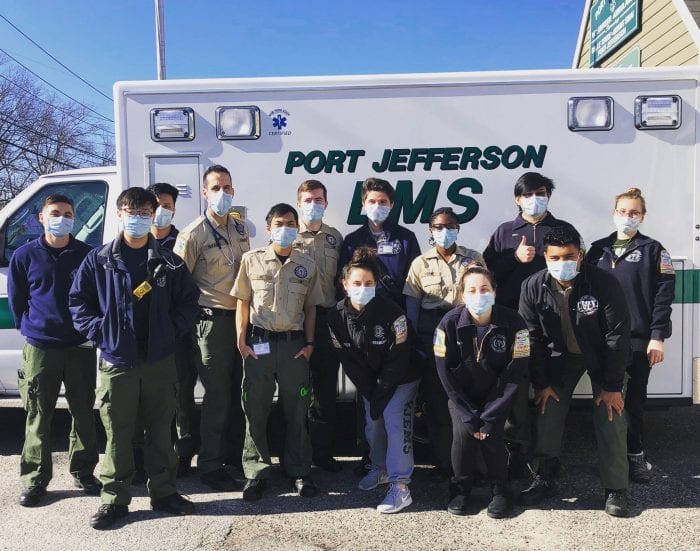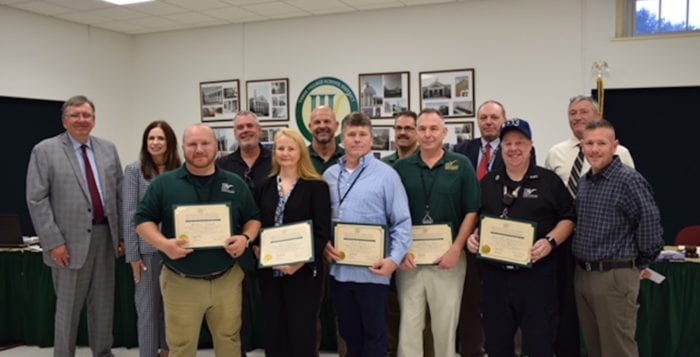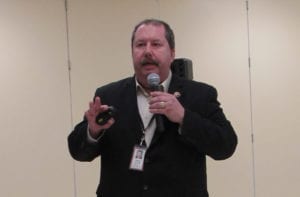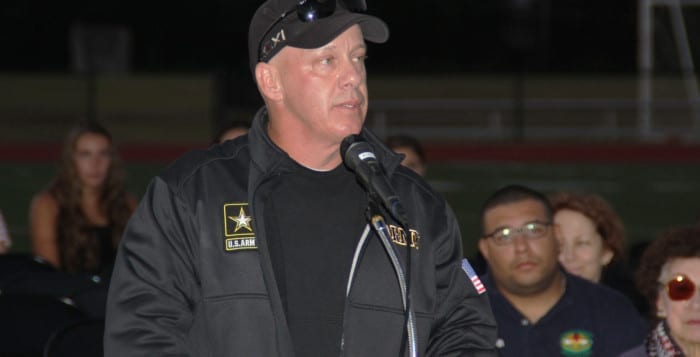By Iryna Shkurhan
The work of first responders is indispensable to communities across the country, but during an exhausting year like 2020, it was even more so. They are the first on the scene of emergencies, and time and again put their lives at risk when they respond to all types of 911 calls. With COVID-19, it meant untold hours of difficulty and hardship, but their work helped secure the safety of thousands.
So, this year gave EMTs, paramedics and firefighters the added challenge of directly responding to the invisible killer, COVID-19, as the pandemic took on communities across Long Island, all while still responding to their usual fires and non-COVID related medical emergencies. Leaders and service members, some paid but mostly volunteers, weathered changes such as increased safety precautions and the rising demand for their assistance.
Wading River Fire Department, made up of about 80 volunteer members, responds to over 1,000 calls every year. When asked if one person stood out this year for their work, Chief Branden Heller agreed that their whole department demonstrated above and beyond work.
“We say the entire department because of all the events that transpired this year,” he said. “Members exposed themselves to more hazardous situations then they were normally used to. Overall, it’s been a very busy year.”
This year his crew of fire and EMS volunteers as well as two paid paramedics overcame a PPE shortage and also dealt with a rise of brush fires, on top of a surge of COVID cases, as emergency calls spiked up in the spring.
Daniel Dongvort, third assistant chief of Smithtown Fire Department, lauded Ann Shumacher, a lieutenant and volunteer EMT for her contributions this year, and throughout her 15-year tenure. She is a mother and full-time nurse, working two jobs, who still found time and energy to devote countless hours to the department whenever she could.
“She was nonstop helping riding ambulances and helping the community all throughout 2020, but what she’s done over her tenure is probably more telling of her personality and her dedication,” Dongvort said. “Her overall enthusiasm, passion and willingness to come out for the next call, time and time again, is something that’s contagious, especially to the younger members.”

Rocky Point Fire Department, with over 130 active members, serves the Rocky Point and Shoreham communities. Volunteer members in the department respond to thousands of EMS and fire calls every year. The department’s David Singer was named an EMS firefighter of the year by Suffolk County Legislator Sarah Anker (D-Mount Sinai) in October.
This isn’t the first time that Singer has been honored for his service to the community.
As a member of the fire department for over 18 years, he has received his fire company’s Number One Responder Award and the Captain’s Award.
Roselyn Coleman, an EMT for Riverhead Fire Department and volunteer for Miller Place Fire Department was nominated by Larry Fischer, fire commissioner and a retired EMS. “She’s one of our best,” Fischer said. Coleman has devoted her time to the community this year and showed consistent dedication by splitting her time between both departments.
Port Jefferson Volunteer Ambulance Corps provides emergency medical services and EMS protection to thousands of Long Islanders at all hours of the day. During the height of COVID, volunteers at Port Jeff EMS were working close to 180 hours in a two-week period. Many of the volunteers are students at Stony Brook University, who balance their EMT duties with their academic responsibilities. Nestor Kissoon and Adam Jones are two student-volunteer EMTs who were enrolled in SBU this year.
“They did not shy away at all through the pandemic, and increased their hours to help meet the needs of the patients and the community,” said Virginia Ledford, administrative director of Port Jeff EMS. “They went beyond what was asked of them this year, and both always maintain a positive attitude.”
Two full-time paramedics — Rob Stoessel, chief and executive director, and Mike Presta, deputy chief — worked tirelessly this year for their department.
“At the beginning of the pandemic, they stayed at the building for what felt like weeks to make sure everyone was safe, prepared and that the needs of the community were being met,” Ledford said.

John Quimby, chief of Mount Sinai Fire Department, was commended by his first assistant chief, Randy Nelson. Quimby’s first year as chief came at the same time as COVID, and such a time required making tough but necessary decisions to prioritize the safety of his team. This year was especially difficult for the department after a few members passed away.
“Ensuring that in everything that we do, the members’ safety and health has always been paramount in all the decisions that he’s made,” Nelson said of the chief.
Quimby made the decision to halt volunteer training in April, which Nelson said was crucial to the department, especially to minimize the spread of COVID-19. The chief also made the decision to conduct all meetings virtually.
“It makes me feel a lot better about the work that we do, and a lot more comfortable given the situation,” Nelson said. “It’s an uncomfortable situation to be in, but his decision-making through it all has certainly made it a bit easier to accept.”
Stony Brook Fire Department Chief Pete Leonard was also named an EMS firefighter of the year, this time by county Legislator Kara Hahn (D-Setauket) for her legislative district. Leonard has dedicated his time and energy to the fire department for over 35 years and has been a crucial asset to the Stony Brook community, this year especially.
In addition to his duties as chief, he also works as a full-time paramedic with Stony Brook University Hospital, where he is the first to provide care for critically ill patients being transported to hospitals. He continued to work throughout the pandemic as his department received a massive 10% in calls in the spring.
Leonard described managing both responsibilities as “a delicate balancing act” where he worried about his health and safety on the job as a paramedic, and then came home worrying about the safety of his 75-member department.
“There isn’t anything I wouldn’t do for them,” he said. “And there isn’t a thing there they wouldn’t do for their community. Between our volunteer and paid staff, they have been exemplary and beyond words.”
He also described the cooperative relationship between all the fire departments on Long Island as they endured shortages of PPE. If one department was low on supplies, another department would chip in to offer theirs. They reached out to other departments to help out whenever necessary and, because of their cooperation, no department has had to go without PPE this year.
“It was a very cooperative relationship, and really showed the true spirit of what it is to work in this industry, and work together,” Leonard said.








